Bubnis, who assumed the role last year, said it wasn’t really a hard call.
“As artists, our students are resilient and have the skill set to adjust and adapt accordingly. I felt it was important for our collective morale to forge ahead with the season. Our mainstage season is one of our anchors that we build our year upon and keeping it intact as everything around us was changing so rapidly was important to us,” she said.
“I wanted us to face the challenges of the semester head-on. That meant pushing through and finding solutions. Going off the grid is not what the spirit of the theatre and our program is about. The show must always go on,” she said, adding that most of the program’s classes are being offered in a hybrid online/in-person format.
And so, on Oct. 8 at 8 p.m., the department will kick off a season titled “Into the Unknown” with a virtual production of Jaclyn Backhaus’ Men on Boats. The show, which will be directed by Sarah Elizabeth Wansley, will run on Zoom for three nights, free of charge. It will be followed in November by a virtual production of Chekhov’s Uncle Vanya. In the spring, productions of Water by the Spoonful by Quiara Alegría Hudes and Everybody by Branden Jacobs-Jenkins will follow.
Many of the theater program’s fall classes will revolve around the mainstage season, with professors using remote learning—and remote performances—as a way to explore important elements of acting and collaboration.

Connecting to Each Other Through Screens
Dawn Saito, an artist-in-residence who teaches Acting 1 and Movement for Actors, said she has had success on Zoom teaching the Laban movement analysis, a method and language used for describing, visualizing, interpreting, and documenting human movement.
“I have many exercises for opening up the body so the actor can transform into different characters, textures, and colors,” she said.
“They have enough room to be able to inhabit these images that I prompt them with.”
Scene work between two actors can be a challenge when a student is not in the same physical space as their partner, but that too can be overcome. During class, Saito sends students to breakout rooms, where they work together to listen and respond to each other.
In the exercise, one actor will move while the other remains frozen. The actor that is frozen will then respond to the movement of the one who is moving. After practicing with each other, they rejoin the larger group and share their progress. (To see movement pieces created by Saito’s students during quarantine last spring, click here.)
“A much as possible, I’m asking actors to radiate their energy, so that they’re connecting to their partners through the screen,” Saito said.
To create the appearance of action, students have practiced “handing” a cup of tea to one another by moving it toward the camera, and when they move their hand, the person on the other side will seemingly receive it. Because students are learning how to engage in their whole body, she isn’t worried that it’ll be difficult to transition back to in-person acting once the pandemic has subsided. In any case, actors have a primal need to be heard, she said, regardless of the platform.
“Art is necessary, especially in challenging times. People need an outlet, they need to see their stories told, and the cathartic process is healing,” she said.
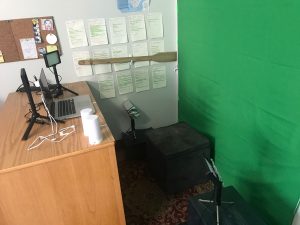
Contributed photo
Reflecting on Different Aspects of Theater
Michael Zampelli, S.J., an associate professor of theater who moved to Fordham this year from Santa Clara, is one of three professors teaching theater history this semester. His class which meets both online and in-person, focuses on the purpose of theater.
His class gives students a chance to reflect not only on what people thought of the theater historically and how it functions in society, but also what is happening to them right now, he said.
“It’s encouraging a sort of self-implicating reflection on what they do in a way that I don’t think would have been the case if we were doing this pre-Covid. Even though you hoped they were asking themselves questions like ‘How this is affecting me?’ and ‘How are we learning about how theater companies form?’—you could always have not gone down that road,” he said.
“Now it’s much harder to not go down that road, precisely because they’re responsible for generating theater during a time of great upheaval. The questions are not theoretical questions.”
Raekwon Fuller, a second-year student at Fordham College at Lincoln Center, created this piece, which is meant to evoke what it feels like to be in Fuller’s universe, for Dawn Saito’s Movement for the Actor”class.
Learning to Speak the Same Language
Ntokozo Fuzunina Kunene, a designer who joined the faculty last year, has been teaching the class Theater Collaboration remotely from her native Johannesburg in South Africa. The class, which she co-teaches with acting program head Matthew Maguire, helps future directors, playwrights, designers, and actors speak to each other more effectively.
“I’m a costume designer, but I can’t necessarily think in terms of lighting, so I still want to make sure that I’m able to communicate with the light designer, because so much of our work impacts each other,” she said.
“When they say, ‘Oh, this is too bright,’ I need to be able to understand how to help reduce the brightness. Maybe something that the actor is wearing is too white. So how do we work together to combat that?”
To achieve that, the class is structured around productions that students from different theater tracks, such as acting and design, are invited to create independently based on prompts, which range from lengthy conversations that Kunene and Maguire record in advance to simple five-word poems.
Let’s Be More Limber
Clint Ramos, the head of the Design and Production track, changed the syllabi in his classes so that instead of working on several projects, students are focusing on one mainstage production for the whole semester.
Rather than adapting traditional theater to the current circumstances, he sees students innovating to create a new form. When you stage a production via Zoom, for instance, it’s worth investigating what it means to say that characters in a play are together in a specific room.
“Does it mean the actors are using the same background? The same lighting?” he said.
“For designers, that bridge already existed, because a lot of the designs are also created for film. This gave us an opportunity to lean in on that bridge. We’ve kind of overlooked this because we were so into live performance. We’re saying, let’s be more limber and see that you can do. The more limber the students become, the more possibilities they have for the future.”
Ramos has also enlisted five university theater programs in the Northeast for an online production stemming from themes in One Flea Spare, a 1995 play by Naomi Wallace set in a plague-ravaged London during the 17th century. Students are virtually attending classes at other universities and are collaborating with each other on works connected to the play. When it is finished, the recordings will live on a website hosted by Fordham.
Liliana Gutierrez, a second-year student at Fordham College at Lincoln Center, created this piece, which is meant to evoke what it feels like to be in Gutierrez’ universe, for Dawn Saito’s Movement for the Actor class.
What Will ‘the Biz’ Look Like?
Theater is also big business, and that business is facing hard times; Broadway has been dark since March. Students who took Theater Management with Stephen Sosnowski, FCLC ’03, normally attended class at his office in Times Square. Sosnowski is senior vice president at SpotCo, where he has spearheaded advertising campaigns for more than 50 Broadway shows and cultural institutions.
His first remote class featured guest speaker Matt Ross, creator of the COVID-19 Theater Think Tank, which is working on processes for theaters to reopen safely. Sosnowski was reticent about the class at first but said he felt optimistic by the energy students brought to the meeting.
“I got a little emotional at the end of the class. These students coming to class; I’m in awe of them, frankly,” he said.
He admitted it’s impossible to predict with certainty what the industry will look like when it emerges from the pandemic. But he’s tried to provide a window into that future, through guest speakers such as Victoria Bailey, executive director of the Theater Development Fund; and Adam Siegal, managing director of Lincoln Center Theater.
“Everything I talk about is, ‘What was it like pre-March 12, and what do we think it’ll look like and what will the opportunity be like,’” he said.
“The key word is opportunity. I see this as a time where there’s a lot of opportunity to enact change. We can figure that out together.”
For a “backstage” tour of Men on Boats by senior Chloe Rice, visit the theatre department’s Instagram page.
]]>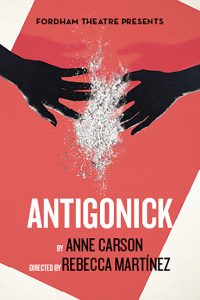 That’s the conundrum of Fordham Theatre’s 2018/2019 mainstage season, which opens on October 4 with a contemporary translation of Sophocles’ Antigone. Director Matthew Maguire said that since American politics and culture is in the same state of chaos as it was last year, this was the right time to ditch formal themes, such as last years’ questions of American identity, and Fordham’s outsider roots the year before.
That’s the conundrum of Fordham Theatre’s 2018/2019 mainstage season, which opens on October 4 with a contemporary translation of Sophocles’ Antigone. Director Matthew Maguire said that since American politics and culture is in the same state of chaos as it was last year, this was the right time to ditch formal themes, such as last years’ questions of American identity, and Fordham’s outsider roots the year before.
“I got tired of season titles that felt like rhetoric; I couldn’t think of a better title for this year’s season that was substantially different from last year’s,” he said.
Given all that has happened in the last year, Maguire said he felt it was necessary to be smarter and savvier in how plays were selected. Each one is in some way a resistance to a vision of the United States as a country that is nationalist, xenophobic, and dominated exclusively by heterosexual white Christians, he said. The works do share a common thread though: What happens when radical change disrupts to heretofore stable systems?
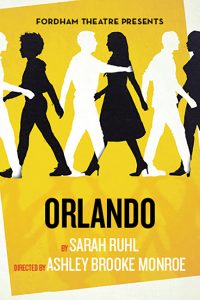 Antigonick, which was chosen with the November elections in mind, asks what happens when a young woman defies rigid state power. Orlando, a dreamy adaptation of Virginia Woolf’s novel of the same name, asks what happens when a man is suddenly transformed into a woman. Satellites is set in a gentrifying Brooklyn neighborhood and features a multi-racial couple struggling to answer the question, what happens when cultures clash?
Antigonick, which was chosen with the November elections in mind, asks what happens when a young woman defies rigid state power. Orlando, a dreamy adaptation of Virginia Woolf’s novel of the same name, asks what happens when a man is suddenly transformed into a woman. Satellites is set in a gentrifying Brooklyn neighborhood and features a multi-racial couple struggling to answer the question, what happens when cultures clash?
The season ends with Mr. Burns, a musical set in the aftermath of an unspecified apocalyptic event. The survivors bond over a shared love of The Simpsons episode Cape Feare, and eventually build a tradition around staged reenactments of it. It is, Maguire said, an attempt to answer the question, ‘What happens if people have to rebuild their culture through the art they make?’
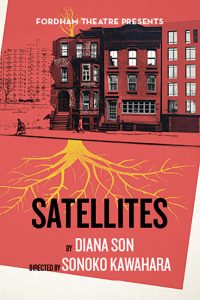 “It’s a wonderfully dual question because it says something to the theater makers about the importance of what that they do, but it also says something to audience about how story telling can bind a culture, and how the stories that are meaningful to them will protect them or divide them,” he said.
“It’s a wonderfully dual question because it says something to the theater makers about the importance of what that they do, but it also says something to audience about how story telling can bind a culture, and how the stories that are meaningful to them will protect them or divide them,” he said.
As is the Fordham Theatre program’s custom, students played a major role in choosing the plays. William Recce, a senior playwriting major at Fordham College at Lincoln Center, participate in the five forums, and made a strong case for Mr. Burns inclusion. He’d been a fan of it since it debuted in 2012, partly because of its realistic depiction of the power of pop culture. It also resonated on a deeply personal level, he said, because it’s ultimately about collaboration and making art in trying times.
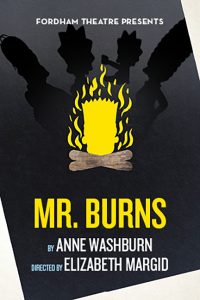 “For a theater program that is all about collaboration and building something from the ground up and sifting through the ashes of our everyday world and trying to find something beautiful, I thought, it’s a perfect piece,” he said.
“For a theater program that is all about collaboration and building something from the ground up and sifting through the ashes of our everyday world and trying to find something beautiful, I thought, it’s a perfect piece,” he said.
Ultimately, Maguire said he hopes the plays are a positive means of resistance. For those who embrace xenophobia, racism, and nationalism, they’re meant to show there’s another way. For those who already embrace an inclusive vision of the country, they’re meant to be nourishing. Either way, they should make people think, and ideally take action.
“Plays should change people’s lives. You should walk out of a theater, and something should make you decide, ‘I think I’m going to do this,’ he said.
“If it doesn’t change your life, we have not done our job.”
The plays include:
Antigonick by Ann Carson, directed by Rebecca Martínez
Oct. 4, 5, 6, 10, 11, 12
Orlando by Sarah Ruhl, directed by Ashley Brooke Monroe
Nov. 7, 8, 9, 15, 16, 17
Satellites by Diana Son, directed by Sonoko Kawahara
Feb. 21, 22, 23, 27, 28, March 1
Mr. Burns, by Anne Washburn, directed by Elizabeth Margid
April 10, 11, 12, 24, 25, 26, 27
]]>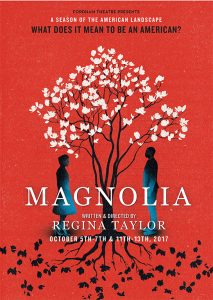 The debate about what it means to be citizen of this country has always been fraught with tension.
The debate about what it means to be citizen of this country has always been fraught with tension.
National acrimony was evident during and after the 2016 presidential election, and it became even more apparent after white supremacists and neo-Nazis staged a rally in Charlottesville, Virginia this summer, said Fordham Theatre’s director Matthew Maguire. President Trump’s casting of blame on “both sides” for the Charlottesville violence may have made it tempting for many to dismiss Trump supporters, but Maguire feels conversations should continue.
Fordham Theatre’s mainstage season, What Does It Mean to Be an American?, is meant to be a nudge in that direction.
“In his farewell address, Barack Obama said ‘If we want change, we have to go the long route, which is to talk to each other,’” Maguire said.
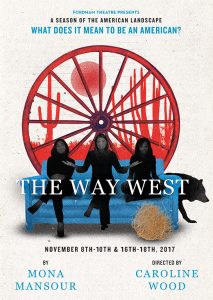
“I hope audiences come away from these plays feeling that they want to pick up the mantle and engage with others who they might otherwise be tempted to shut out.”
The plays include:
Magnolia, written and directed by Regina Taylor, the 2017 Denzel Washington Endowed Chair in Theatre;
October 5, 6, 7, 11, 12, 13
The Way West, by Mona Mansour, directed by Caroline Wood;
November 8, 9, 10, 16, 17, 18
Beautiful City, by George F. Walker, directed by Elizabeth Margid;
February 22, 23, 24, 28 & March 1, 2
Macbeth, by William Shakespeare, directed by Dawn Akemi Saito.
April 11, 12, 13, 19, 20, 21
Magnolia, an adaptation of Anton Chekhov’s Cherry Orchard set in Atlanta in 1962, touches on issues of both race and class, and features a newly elected mayor who has overseen the construction of a wall between a black and a white neighborhood.
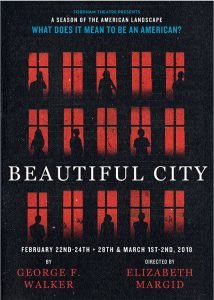 The Way West revolves around a family matriarch who is an absolute believer in the pioneer spirit of the country, and who maintains a steadfast faith in self-reliance even as her world disintegrates. Maguire said the character will resonate with those who don’t believe the country needs a social safety net.
The Way West revolves around a family matriarch who is an absolute believer in the pioneer spirit of the country, and who maintains a steadfast faith in self-reliance even as her world disintegrates. Maguire said the character will resonate with those who don’t believe the country needs a social safety net.
“Self-reliance is one of the founding myths of our culture. There are plenty of places in the United States at the moment that are still fueled by the nostalgic myth,” he said.
“Is the America that we once knew ever going to come back? And how do we reinvent ourselves? This is play that might get people from two sides talking to each other, because there is a spirit in it that’s indefatigable.”
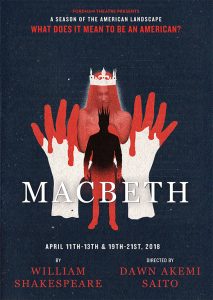 The spring semester will kick off with Beautiful City, which follows the story of a rapacious landlord trying to take over a whole neighborhood, and the people who, in their fight to stop him, enlist the help of a woman who has magical powers. Befitting its tradition of performing at least one play that is a classic, the season will conclude with Macbeth, whose focus on the abuse of power speaks for itself, Maguire said.
The spring semester will kick off with Beautiful City, which follows the story of a rapacious landlord trying to take over a whole neighborhood, and the people who, in their fight to stop him, enlist the help of a woman who has magical powers. Befitting its tradition of performing at least one play that is a classic, the season will conclude with Macbeth, whose focus on the abuse of power speaks for itself, Maguire said.
“What does it mean to be an American? Is there an allegiance to a wider abstract? If you’re an oil worker in the bayou, a lobsterman in Boston, a Cajun, a Wasp, or if you’re Thurgood Marshall, what’s the commonality? What makes an American? It’s not so simple to say an allegiance to the Constitution, because that’s too abstract,” he said.
“Plays should be able to change people’s lives, so that when they leave, they see the world differently, and they decide to do something. These plays do that—and are all enormously entertaining as well.”
]]>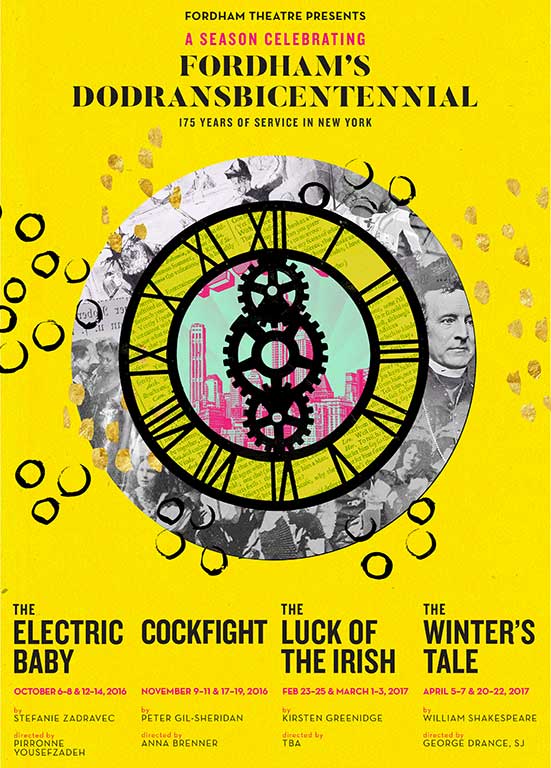 In the pantheon of New York City institutions, Fordham is as ingrained in the city’s fabric as the Metropolitan Museum of Art and fellow Bronxites the New York Yankees.
In the pantheon of New York City institutions, Fordham is as ingrained in the city’s fabric as the Metropolitan Museum of Art and fellow Bronxites the New York Yankees.
It wasn’t always so, though. When Archbishop John Hughes founded what was then St. John’s College in 1941, the school was a haven of sorts in a city that was hostile to Irish immigrants, like him.
This year, in honor of the University’s Dodransbicentennial celebration, Fordham Theatre will perform four plays on its main stage that feature characters who, like Archbishop Hughes, cope with displacement—by creating their own reality.
The four plays that will be staged at Pope Auditorium are:
Electric Baby by Stefanie Zadravec, directed by Pirronne Yousefzadeh
Oct. 6, 7, 8, 12, 13, 14
Cockfight by Peter Gil-Sheridan, FCLC ‘98, directed by Anna Brenner
Nov. 9, 10, 11, 17, 18, 19
The Luck of the Irish by Kirsten Greenidge, directed by Geoffrey Owens
Feb. 23, 24, 25, March 1, 2, 3
The Winter’s Tale by William Shakespeare, directed by George Drance, S.J.
April 5, 6, 7, 20, 21, 22
Theatre program director Matthew Maguire said that the four plays share a comic sensibility; this year, there are no tragedies in the repertoire.
“Since it’s Fordham’s celebratory year, we wanted to celebrate with comedy, but comedy with teeth, and comedy that would be meaningful,” he said.
As is custom, students played a large part in the selections, which were discussed at five forums last year. Maguire noted that Electric Baby was brought to his attention by a student who’d seen it performed at the Two River Theater in New Jersey. The play is about a Nigerian and a Romanian immigrant who shape the lives of the Americans around them.
In Cockfight, a character is displaced both in the literal sense, having fled from Cuba, and in the emotional sense as well, as a gay boy trying to come out in a world dominated by his father’s machismo.
Luck of the Irish is the story of a black family who moves into a white neighborhood through an arrangement with an Irish-American ghost-buyer. They, too, are both literally and emotionally displaced, because they are made to feel that they don’t belong.
And in the classic The Winter’s Tale, Hermione is driven from her home by her husband’s insane jealousy, and Perdita, their daughter, is abandoned in a foreign land at birth.
In addition to striving to bring quality roles to students, Maguire said he also strives to stage plays whose creators are available to collaborate. This season, playwrights Peter Gil-Sheridan and Stefanie Zadravec will be present for rehearsals. As a graduate of Fordham’s theatre program, Gil-Sheridan, who now heads the MFA Playwriting Program at Indiana University, is a true success story, said Maguire.
“Their presence influences the way our students are going to get work down the road, because they’ve been in the room with these working artists. They may think a good role is John Proctor in The Crucible, and of course it is, but for an actor, it’s even better if you get to step into a role for the first time with the playwright,” he said.
“A good role is one where you can change people’s lives. Social justice is what this school is all about, and so our season emanates a sense of social justice.”
]]>This past spring Henderson joined Denzel Washington, FCLC ’77, and Viola Davis in the film version of August Wilson’s Fences, set to be released this December. The three starred in the 2010 Broadway production which won the Tony for Best Revival of a Play. He also starred in the Pulitzer Prize winning play Between Riverside and Crazy in 2015. He recently retired as a theater professor at the State University of New York at Buffalo, a position he has held since 1987.
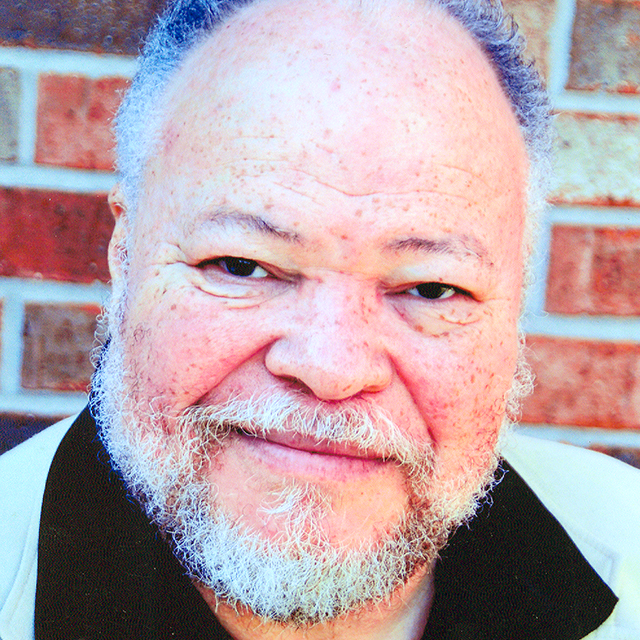
“As an actor you’re fortunate to have a tough schedule. That means you’re working,” said the veteran actor.
From playing opposite Washington in Fences in 2010 to a recurrent role as a judge on TV’s Law and Order to his role as a White House servant in the film Lincoln, Henderson has transcended the limitations of a single medium. He credits his experience in stage acting, however, with giving him the chops to do so.
“The theater is where acting began, so if you want to study the craft of acting you want to study the history of it,” said Henderson.
Henderson, a native of Kansas, has performed extensively both on and off Broadway. He studied at the North Carolina School of the Arts, Purdue University, and at the Juilliard School. He also studied with the late director and actor Lloyd Richards, the former dean of the Yale School of Drama.
When Henderson started out, he said that theater was about “consciousness raising” and about “being involved in the process of citizenship.” It’s a stance that he still holds to this day, he said.
“Theater is a great service to the public, to the community, and to society,” he said. “It allows us to commune in our humanness.”
Matthew Maguire, the theatre program’s director, introduced himself to the actor in 2006. At the time Henderson and director Israel Hicks were making the argument that it was time for the great plays of the African-American canon to be considered great American plays, said Maguire.
“It was from him that I got the idea to ask actors to play across ethnic lines in acting class,” said Maguire. “The actors of color have always played Shakespeare and Chekhov, but the white actors never play Lorraine Hansberry and August Wilson. Now they do, thanks to Stephen.”
Maguire called Henderson a Sensei, a “teacher of teachers,” whose support was key in bringing the Fordham program forward when it came to racial issues in acting. Maguire said he had long ago asked his students to cross ethnic lines by playing roles of other races, which made some students uncomfortable. He said it wasn’t fully understood until Henderson told the students to prepare for the role as they would any other: through a close reading of the text.
“The larger sense of what it is to be a human being pervades his work as a teacher and an actor on the stage. He’s got this amazing balance of affirming students, but there’s no lack of rigor in his approach. As a teacher, he’s tough.”
Henderson said he is not a purist when it comes to teaching, and said he intends to pass on a variety of methods he’s learned over the years. But while he holds various methods of acting in high regard, he said good acting always refers back to the play and the audience.
“The work is text specific,” he said. “You’re examining a piece of dramatic literature, and the artist has to come up with a series of exercises on how to best to serve the play.”
“You start with the rules, but it’s not about the rules; it’s about the exceptions. What is right for you in this moment? It’s not a self-absorbed journey. It’s about the others in the room.
“It certainly isn’t just about entertainment. We may do it for the audience, but it’s always done on the art’s terms.”
]]>Next week at Fordham, a forum will plunge into the thorny casting issues that arise in theater.
On May 2, the theatre program co-sponsors Beyond Orientalism: The Forum, at 7 p.m. in the Pope Auditorium. The forum, which will feature two panel discussions and a breakout session, is co-sponsored by the Asian American Arts Alliance, Asian American Performers Action Coalition (AAPAC), Theatre Communications Group, and Alliance for Inclusion for the Arts.
The University hosted a similar forum with AAPAC four years ago, when the group released a study indicating that Asian Americans received only 3 percent of all available roles in the nonprofit sector, and only 1.5 percent of all available roles on Broadway in the past five years.
Matthew Maguire, director of the Fordham theatre program, said the situation hasn’t improved much since then, as evidenced by a series of yellowface/brownface theater productions around the country last year.
“This just infuriates Asian Americans,” he said. “If you’re in a commercial situation, you should never take a job away from someone who has fewer opportunities than you do to get that job. That white people are taking jobs that ought to go to Asian actors is just wrong.”
He said that Asian actors are often still viewed as foreigners. He recalled that one actresses attending the 2012 forum said it was common for people to compliment her on how well she spoke English—not realizing she was born and raised in the United States.
The timing for the forum is fitting, he said, given that this year’s Mainstage Season, “A Season from the Mountaintop,” was about inclusion, and featured an Asian classic, The Orphan of Zhao, directed by Ralph Peña, a native of the Philippines.
The difficulties with that production illustrated the challenges that lie ahead, Maguire said.
“We cast all the Asian actors we have, and the other roles were played by white actors,” said Maguire. “But they weren’t playing yellowface, meaning they weren’t trying to appear Asian—they weren’t changing their eyes, wearing black wigs, or speaking with an accent. We treated it like a classic in the same way that we would treat Shakespeare, giving work to our Asian actors but also giving other actors the chance to explore another culture.”
“I thought this was a wonderful thing, but there were some Asian students who were upset. A few, in fact, were quite upset.”
This debate about what constitutes proper casting is not limited to Fordham. Last year, the playwright Lloyd Suh insisted that a Pittsburgh college halt production of his play Jesus in India because of the cast’s ethnic composition, said Maguire.
Maguire said he disagreed with the decision to limit that production, saying that if you want to spread the word about the Asian-American experience and Asian-American writing, you should expose it to as many people as you can. He joked that in tackling this topic at the forum, the organizers are deliberately “opening up a Pandora’s Box.”
“The productive side of this is, now all the demons are rushing out and we get to look them in the eye and see if we can find common ground,” he said.
For more information rsvp at [email protected].
]]>Jared McNeill, FCLC ’08, knows how important it is for actors to maintain their passion for theater. “A lot of people talk about it as a flame burning in your heart. I always think it’s not a big fire; it’s a tiny candlelight. And there’s a lot of wind out there! You’ve got to know where it’s coming from.”
McNeill started out working small jobs in the New York theater scene. He said the collaborative nature of Fordham’s program, where performance-track students are required to learn design and production skills (and vice versa), helped him get noticed. Now he’s touring the world with Tony- and Emmy award-winning director Peter Brook’s company and spending much of his time in Paris. It’s a path his agent recommended against.
“They’re there to assist you on your road,” McNeill said of his experience with agents, “but they’re not there to tell you how to live your life or do your career.” It was actually Matthew Maguire, director of the Fordham Theatre program, who helped McNeill think through the decision that has ultimately shaped his career.
McNeill and four other successful alumni returned to campus on April 4 to give graduating seniors personal perspectives and career advice before their Senior Showcase, two days of performances and receptions where students can network with industry professionals.The panelists, whose conversation was driven entirely by student questions, gave advice about graduate school, discussed working in theater versus television, and shared honest and sometimes-humorous stories about the audition process and the difficulties women and minorities often face in the industry.
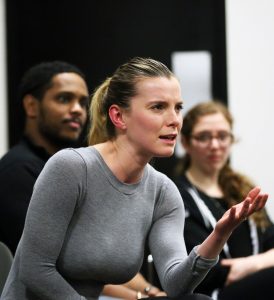
Betty Gilpin, FCLC ’08, an actress who had a recurring role on Nurse Jackie with Edie Falco and will soon be seen on CBS’s Elementary, told students how her days at Fordham motivate her even when things get tough. “Especially as a woman, it’s totally different. You’re going to be told things like, ‘Don’t make that weird face when you cry,’ or, ‘Great, just wear more makeup next time,’” she said. “But the Fordham is in you, and that’s important.”
“What you’ve built here is invaluable,” Gilpin said, referring to the theatrical training she received and the bonds she formed at Fordham. “You’ve built this ocean of weird to draw on, to love from, that not everybody has.”
Amirah Vann, FCLC ’02, who also started her career acting in small shows on stage in New York City before landing the part of Ernestine on Underground, WGN America’s new show about the Underground Railroad, stressed that it’s important to “take the work when it comes” and “build relationships,” but to also create your own path. “The clearer your vision of what kind of actor you want to be, what things are important to you, the more [your agent and casting directors] will be on board,” she said.
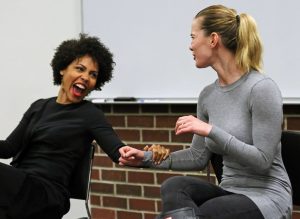
She also advised students to be assertive on auditions, and to remember that the casting directors don’t always know what they’re looking for. When you’re given a part to read for, she explained, “you’re not trying to solve some problem you’re presented. You know this character. You come in with choices and opinions.”
It’s a little different for Isabelle Simone, FCLC ’12, who has worked as a costume assistant, often with renowned and prolific designer Ann Roth, on Broadway shows like Porgy and Bess, Book of Mormon, and On Your Feet. “I’m creating someone else’s vision,” explained Simone, who emphasized the social nature of the theater business.
“Every job I’ve gotten has been a direct result of the first internship I got from Becky [Bodurtha, the Fordham costume shop supervisor],” she said. It’s just as much about being easy to work with as it is about being talented. “If you’re good, the word gets out. Much of it is about being nice and being a good person.”
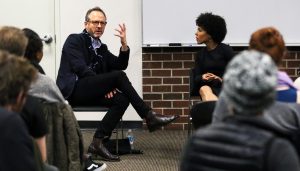
John Benjamin Hickey, FCLC ’85, who won a Tony Award for his role in The Normal Heart and an Emmy nomination for his starring role on Showtime’s The Big C, agreed. “That behavior does not go unrewarded,” he said.
Hickey also urged seniors not to be discouraged if they don’t get an agent through the Senior Showcase.
“It certainly won’t be the last time somebody says no,” he said. “It’s just the very beginning of your career. Keep trying to learn. Every hard thing teaches you. You just have to keep trying to figure out new ways to keep at it.”
The Senior Showcase is open only to industry professionals, such as agents and managers. But you don’t have to be an industry pro to enjoy this year’s senior class reel below!
]]>
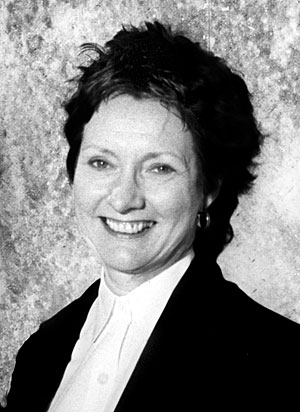
Photo courtesy of The Public Theater.
JoAnne Akalaitis, an award-winning director and founder of the experimental theater company Mabou Mines, will join Fordham’s theatre program this fall as the Denzel Washington Endowed Chair in Theatre.
“JoAnne is a giant in the American theatre,” said Matthew Maguire, director of the theatre program. “Her work with Mabou Mines was the finest work I saw in theater when I arrived in New York, and it transformed the way I saw the possibilities of the theater.”
Akalaitis’ decades-long career includes five Obie Awards for direction and sustained achievement. She founded the critically acclaimed Mabou Mines theater company in 1970 with her ex-husband, composer Philip Glass. Located in New York City’s East Village, the company is an artist-driven coalition dedicated to experimental theater.
“Mabou Mines is one of the most important experimental theater companies in the United States, and it is still going strong,” Maguire said. She has also lent a radical perspective toward re-imagining classic works, including plays by Beckett, Genet, Pinter, Euripides, and Shakespeare.
She accepted this year’s chair after its initial holder, actor Stephen McKinley Henderson, withdrew this month due to an urgent health issue.
Akalaitis graduated from the University of Chicago in 1960 with a degree in philosophy, but later decided to pursue acting. She studied theater with the Actor’s Workshop in San Francisco, the San Francisco Mime Troupe, The Open Theater in New York, and with acting theorist Jerzy Grotowski in France.
She has directed at the American Repertory Theater, Lincoln Center for the Performing Arts, the New York City Opera, Goodman Theatre, Harford Stage, Opera Theatre of St. Louis, the Guthrie Theater, and the Court Theatre in Chicago, where she was artist-in-residence.
She is the former artistic director of the New York Shakespeare Festival, a position that she was appointed to by its founder, Joe Papp.
Papp said Akalaitis has “the most original mind in the theater today.”
“As a leader, she is independent. She doesn’t recognize boundaries and you can’t pigeonhole her. She has great drive. And she is very astute about how the theater is run.”
In addition to directing, Akalaitis has held several academic positions, including the Andrew Mellon Co-chair of the Directing Program at Juilliard and the Wallace Benjamin Flint and L. May Hawver Flint Professor of Theater at Bard College. She is the recipient of a Guggenheim Fellowship, National Endowment for the Arts grants, and a Pew Charitable Trusts National Theatre Artist Residency Program grant.
“We are thrilled that she is doing us the honor of joining us for a semester as the fifth Denzel Washington Chair,” Maguire said.
]]> Former Fordham professor Michael Mayer directed the new production of Rigoletto.
Former Fordham professor Michael Mayer directed the new production of Rigoletto.Photo Courtesy Metropolitan Opera.
The Metropolitan Opera’s new production of Giuseppe Verde’s Rigoletto, which opened Jan. 28., is a neon-infused spectacle directed by former Fordham professor Michael Mayer, in his Met debut.
Best known to Broadway audiences for his rock musicals Spring Awakening and American Idiot, Mayer brought swagger to the Met production by transposing the opera’s 19th-century Venetian setting to 1960s Rat Pack Vegas.
On opening night, it may have struck a few in the Met’s “Penguin section” (the tux-clad patrons of the Dress Circle) as sacrilege, indeed one traditionalist booed the setting in the second act, but Fordham Theatre Program Chair Matthew McGuire said that Mayer’s M.O. isn’t to provoke, but to relate.
“I think he’s always had an iconoclastic approach to the classics,” said Maguire. “He tries to figure out how to relate the material to audiences, often through metaphor.”
Maguire shared an office with the former assistant professor for nearly two years before Mayer left to direct the national tour of Angels in America. He recalled an equally accessible approach to Moliere’s Tartuffe that Mayer directed here at Fordham.
Though not always in an obvious manner, Fordham maintains solid ties to Lincoln Center. There are, of course, official relationships, like the professor exchange between Fordham and Juilliard, such as Bill Baker’s class on the Performing Arts in the 21st Century. And other quietly nurtured programs operate without much fanfare, like PCS’s relationship with the New York City Ballet.
Maguire said he expects the relationship to grow. He has reached out to Rigoletto set designer Christine Jones and hopes to see her teach a class here next fall. For his part, Mayer has been back to Fordham a couple of times as a guest director, and he cast Fordham alumna Frances Mercanti-Anthony, FCLC ’02, in Spring Awakening.
For now, the Fordham community will have to satiate themselves with Mayer’s talent in what promises to be one of the hottest tickets of the Met’s spring season.
-Tom Stoelker
]]> Can one person’s spiritual awakening be placed in the same category as another person’s bout with psychological illness? How, exactly, is a theatre production similar to a Mass?
Can one person’s spiritual awakening be placed in the same category as another person’s bout with psychological illness? How, exactly, is a theatre production similar to a Mass?
Those were among the sticky questions that a panel debated on March 2 at Fordham’s Lincoln Center campus.
“Religion and Madness: Spirituality and Pathology,” a forum co-sponsored by the Fordham Center on Religion and Culture and Fordham Theatre, dwelled on the prominent role that madness plays in theatre and—to a much more controversial degree—in religion.
A packed Pope Auditorium was treated to scenes from the four plays in Fordham Theatre’s 2009/2010 season, dubbed a “Season of Madness” because of the thematic thread that ran though the pieces. They included: The Day Room, Mrs. Packard, Sarita and Hamlet, which will be performed in April.
Matthew Maguire, director of the theatre program, moderated the panel, which featured:
• George Drance, S.J., Fordham’s artist-in-residence and author of Working on the Inside: The Spiritual Life Through the Eyes of Actors (Rowman & Littlefield, 2003),
• James Jones, Ph.D., clinical psychologist and professor of religion at Rutgers University, and
• Broadway actress Julie White, who won a 2007 Tony for her performance in The Little Dog Laughed.
The scenes provided a jumping-off point to discuss madness as a social construct. The panelists also debated whether the same external forces that drive a person mad might also lead to a state of spiritual bliss in another person, provided the second person had a stronger psyche.
Father Drance noted that in contemporary culture, questions of madness and spirituality are viewed primarily through the lens of empiricism, which relies on observable evidence to frame reality.
“We tend to reject that which goes against what can be verified empirically,” he said. “In our culture, we find ourselves mistrusting unverifiable aspects of our lives. Imagination, emotion, intuition and revelation—these are precisely the places where religion and madness play.”
Jones said that symptoms of madness can be understood as cultural constructions.
“Is it madness to encounter the blessed Virgin Mary? Is it madness to be aware of the presence of, and converse with, a beloved spouse or parent who died recently? Is it madness to pray for a sick person with a profound expectation that they will recover?” he asked. “Forty years ago, the local family shrink was taught that such things were signs of illness and required medical intervention.”
He also wondered if theatre can be a container for a maddening impulse that otherwise might have been channeled exclusively toward religion. Regardless, he urged more compassion for those on the ends of the mental health continuum.
“Mental health and pathology, like physical health and pathology, exist on a continuum that we all move back and forth along,” he said.
“Under stress, trauma and shock, we may all slide toward the pathological end,” he said. “If we get enough social support, perhaps even a spiritual discipline, we might move toward the healthy end.”
It was Maguire, however, who made the most explicit connection between the religious fervor behind the ritual and sacraments of the Mass, and the madness inherent in drama, which is the driving factor of a theatre production.
“When I learned as an altar boy about transubstantiation, I realized that there was a mystic difference between Catholics and Protestants. Catholics believe that the bread and the wine literally become the flesh and blood of Christ,” he said.
“I think that’s what happens with the stage. There’s a transubstantiation—that what we put on the stage is just lumber and hardware and Fordham theatre students. But because we believe, it transforms, and it becomes the thing itself. We impart in a mystical action, and it’s so important that the audience is here, because it’s a communal event.”
]]> Members of Fordham University’s arts and sciences faculty recognized three of their own at the 18th annual Arts and Sciences Faculty Day, held Feb. 5 on the Rose Hill campus.
Members of Fordham University’s arts and sciences faculty recognized three of their own at the 18th annual Arts and Sciences Faculty Day, held Feb. 5 on the Rose Hill campus.
The event honors the work of the faculty in teaching, research and service, and recognizes individual professors for outstanding performance in those areas.
 This year’s winners were:
This year’s winners were:
• David Chabot, Ph.D., associate professor of psychology, recipient of the Undergraduate Teaching Award in the Natural Sciences;
• Evelyn Bush, Ph.D., assistant professor of sociology and associate chair for graduate studies, awarded the Undergraduate Teaching Award in the Social Sciences; and
• Matthew Maguire, M.F.A., professor of theatre and visual arts and director of the Fordham theatre program, recipient of the Undergraduate Teaching Award in the Arts and Humanities.
Maguire, an actor, director and playwright, also delivered the evening’s lecture, “Wild Man,” which was part performance and part analysis of his current one-man show of the same name.
The two-time Obie winner characterized his work as an exploration of the question, “How can we all get more wild?”
“A play is a ride on a runaway stallion,” he said. “Plays are vehicles to transport us to places we would not otherwise go—places of danger, places of abandonment.” It is the job of a playwright, Maguire said, to guide an audience through such wild terrain and return them safely.
Maguire metaphorically danced his way through first-person accounts of some wilder recollections from his childhood, young adulthood and up to, and including, the preparation of the one-man show itself—in which Maguire challenged himself to finish it in just three weeks for a set premiere.
Among Maguire’s wilder recollections were a bloody schoolyard brawl, a restaurant confrontation with a Mafioso and an IRA bomb scare.
Drama itself, Maguire said, may be the artist’s way of striving to safely understand why humans possess primal instincts such as the desire to fight and to kill.
But Maguire balanced his more worldly events with sublime moments that included waking up in a sunlit church pew to sounds of the Mormon Tabernacle Choir, and once feeling touched by grace when allowed to hold a host and chalice in a Mass with his parish priest.
“There are many wild moments that are ordinary,” said Maguire. “If we look for them, we will find that [creative]kernel we can all tap into.”
Maguire said that the one-man show, which was well received by critics, provides him with a new chance—a ‘wildness’—each time he performs in the presence of a new audience.
“Stopping terrifies me,” said Maguire. “As you see, I run a theatre program. I balance a budget. I have a family. I try to be responsible. These are not the works of a wild man, and yet I desperately yearn to hang on to that wildness.”
Equally important, said Maguire, is to inspire students inside the classroom to find their own sense of freedom.
“That is our goal,” added Maguire. “To bring the students into this place of sacred wildness too. Someplace alive, with a pulse.”
The evening was sponsored by the Office of the Dean of Arts and Sciences.
]]>